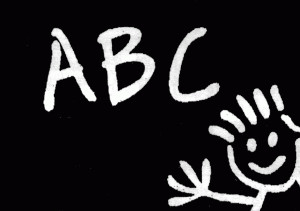
INTRO: This week our Wordmasters Rosanne Skirble and Avi Arditti talk with Grammar Lady about a tricky rule of English.
MUSIC: "Your Song"/Elton John
AA: OK, Rosanne, so why does Elton John — who just a few days ago won a Grammy Legend Award — say "if I WAS a sculptor," and not "if I WERE a sculptor"?
RS: Was, were — what's the difference? Well, it has to do with something called the subjunctive. The subjunctive is a verb form that expresses an idea that's hypothetical or not factual.
AA: It's subtle. The clue is in the use of "were" instead of "was." Here's another example.
You're invited to a meeting. You think you're on time, but you arrive after everyone else.
RS: You feel the need to apologize. But what do you say? For an answer, we turn to Grammar Lady Mary Bruder, a linguist and former English teacher in Pittsburgh.
TAPE: CUT THREE - BRUDER/ARDITTI/SKIRBLE
"'If I was late, please excuse me.' That's simply a conditional form: I might have been late or I might not. If I was, then I'm sorry. But with the subjunctive, it's totally contrary to any kind of fact. 'If I was in Paris right now' - that's wrong, because you're not in Paris and there's no possibility you could get there, so you have to say 'If I were in Paris I'd be."
AA: "Having a lot of fun."
BRUDER: "Having a lot of fun. So when it's contrary to fact, you use the 'were' - 'if I were in Paris,' 'if he were king,' 'if I were a rich man.'"
MUSIC: "If I Were a Rich Man"/Fiddler on the Roof
AA: "it's sort of like 'in the event of' - if I were a rich man, I'd have a lot of money, or I'd be happy or I'd have a big house."
BRUDER: "Right."
RS: "From 'Fiddler on the Roof,' to finish your sentence."
AA: "I'd be Tevye."
BRUDER: "Right, but the thing is, it's not fact. Maybe it's clearer with the verb 'wish'; 'I wish I were in Paris.' With the verb 'wish,' it's always contrary to fact, because you wouldn't be wishing for it if it weren't. The verb 'be' is the most difficult one because it changes from 'was' and 'were.' 'If I was late, please excuse me.' That's a condition. 'If I were rich I wouldn't know what to do with all the money.' That's the subjunctive because I'm not rich and there's not much likelihood of being rich either."
AA: The subjunctive "were" allows for nuance, but Mary Bruder is not sure it will survive in the shadow of the all-purpose "was."
TAPE: CUT FOUR - BRUDER/SKIRBLE/ARDITTI
"Since the subjunctive is so narrowly used in English, it's very possible that it would just disappear."
RS: "And which direction would it be then, which move would it be, all toward which word?"
BRUDER: "I think it would go toward the agreement of the subject and verb. So you'll get 'if I was,' 'I wish I was,' 'I wish he was,' that kind of thing."
RS: "But you know, if we lose the subjunctive, haven't we lost something from our language?"
AA: "A really big word."
BRUDER: "A very troublesome subject, you might say the other way too. If you look at what things have changed since even the early 1700s, the early part of English use in the United States, it's changed tremendously in a lot of ways that I suppose the people who lived then would be sad about. You can't stop language from changing, there's no possibility of doing that, and I think we shouldn't even think to try. But I do think we should continue to learn correctly and use correctly the things that are in the language today. I don't think we have to hurry it on its way to change, I guess is my point."
RS: Advise from Grammar Lady Mary Bruder.
Grammar lady also invites you to send your questions about American English grammar to her web site at www.grammarlady.com, or you can send them to us at word@voa.gov.
AA: But we enjoy getting mail too — like the nice letter we just received from Robert Honakar in Costa Rica, who says our topics "often form a basis for friendly conversations in Valle Azul."
RS: Our address is VOA Wordmaster, Washington, D.C, 20237 USA.
AA: With Rosanne Skirble, I'm Avi Arditti.
MUSIC: "If I Were a Rich Man"/Fiddler on the Roof
詞匯點(diǎn)津:
今天的《詞匯大師》討論了英語(yǔ)的虛擬式subjunctive。我們都知道,當(dāng)用到虛擬式的時(shí)候were將替代was,如:if I were a sculptor。
虛擬式表示假設(shè),通常指不可能實(shí)現(xiàn)的事。hypothetical or not factual,如:If I was late, please excuse me. If I were in Paris I'd be...if he were king或if I were a rich man...
但隨著語(yǔ)言的發(fā)展,虛擬式有逐漸消失的趨勢(shì)。有時(shí)候人們?nèi)允怯脀as,而不是were。我們雖然不能阻止語(yǔ)言的發(fā)展,但我們最好在當(dāng)下用最規(guī)范的語(yǔ)言。











